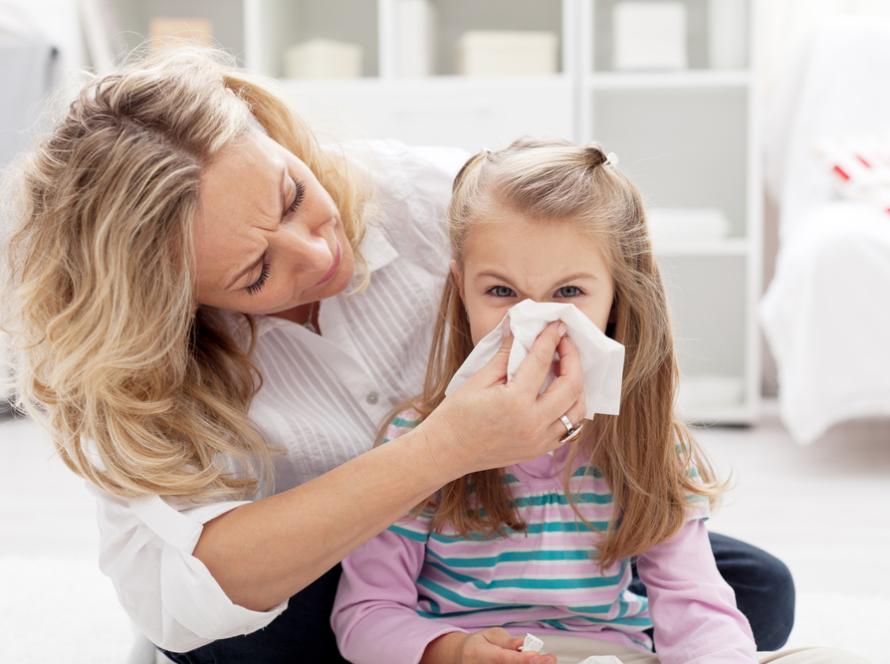When fall rolls in, most parents are focused on back-to-school routines, cooler weather, and maybe even a pumpkin patch visit or two. But there’s one seasonal shift that often flies under the radar—how fall allergies can impact kids’ dental health.
If your child suffers from seasonal allergies, you’re probably familiar with the sneezing, watery eyes, and congestion. What’s less obvious is how these symptoms (and the medications used to treat them) can quietly affect their teeth and gums. Here’s how to spot the hidden connection and protect your child’s smile during allergy season.
1. Mouth Breathing: A Hidden Culprit Behind Cavities
One of the most common allergy side effects is nasal congestion, which leads many children to breathe through their mouths. Although it may seem harmless, mouth breathing can throw off the mouth’s natural balance.
When a child breathes through their mouth instead of their nose, saliva production decreases, and their mouth becomes drier. Saliva is essential—it helps neutralize acids, wash away food particles, and fight cavity-causing bacteria. Without enough saliva, bacteria thrive. The result? A spike in the risk of tooth decay and gum issues.
What You Can Do:
- Encourage your child to stay hydrated to help combat dry mouth.
- Use a humidifier in their bedroom during fall to keep the air moist.
- Schedule a kids’ dental checkup with your pediatric dentist in Guelph if your child is experiencing prolonged mouth breathing.
2. Antihistamines: Relief With Side Effects
Antihistamines are a lifesaver when your child is struggling with allergy symptoms. But these medications—especially the over-the-counter kind—can reduce saliva production even more. Combine that with existing dry mouth from mouth breathing, and you’ve got a recipe for dental trouble.
A dry mouth creates an environment where cavity-causing bacteria can flourish. It also reduces the mouth’s ability to flush out food particles, leaving sugars to sit on teeth and gums longer than they should.
What You Can Do:
- If your child takes antihistamines regularly, talk to your pharmacist or doctor about options with fewer drying effects.
- Consider adding more fresh, water-rich fruits and vegetables to your child’s diet.
- Make sure your child brushes twice daily with dentist-recommended fluoride toothpaste and flosses daily.
- Keep regular kids’ dental checkup appointments to catch any issues early.
3. Fall Treats That Actually Help
Not all seasonal indulgences are bad for teeth. In fact, some iconic fall foods can help strengthen them.
Pumpkin: A Nutrient Powerhouse
Pumpkin is loaded with wonderful nutrients like vitamin A, which supports healthy gums and helps rebuild tooth enamel. It’s also high in zinc and magnesium, which contribute to overall kids’ dental health.
Try incorporating pumpkin into kid-friendly dishes like:
- Pumpkin muffins with less sugar
- Pumpkin soup
- Roasted pumpkin seeds (great for healthy chewing)
Apples: Nature’s Toothbrush
Apples are fibrous and help clean teeth while they’re being eaten. They also stimulate saliva production—especially helpful for kids taking antihistamines.
Just avoid coating them in sticky caramel or sugar-heavy dips. Instead, try:
- Fresh apple slices with nut butter
- Baked apples with a cinnamon sprinkle
By being intentional with snacks, you can make fall treats part of a healthy dental routine.
4. Fall Is Prime Time for a Kids’ Dental Checkup
Fall is a smart time to schedule a kids’ dental checkup. With summer distractions behind you and the holidays ahead, it’s the perfect season to catch small problems before they grow.
During a fall visit, your pediatric dentist in Guelph can:
- Assess for signs of dry mouth or decay linked to allergies
- Check for early orthodontic issues
- Reinforce good brushing habits before Halloween hits
Fall also tends to be less hectic than the winter holiday rush—appointments are easier to get, and you’ll beat the year-end insurance rush.
5. Tips to Protect Kids’ Teeth During Allergy Season
- Hydration is key. Water helps keep saliva flowing and rinses away allergens stuck in the mouth.
- Brush and floss like it matters—because it does. With dry mouth increasing cavity risk, daily oral hygiene is even more critical.
- Watch for signs. If your child complains of dry mouth, has trouble sleeping, or snores, it might be related to mouth breathing.
- Use sugar-free gum. If your child is of the appropriate age, chewing sugar-free gum can promote saliva flow and alleviate dry mouth symptoms.
- Don’t skip that checkup. Even if your child’s teeth look fine, allergy season can stir up issues that a pediatric dentist in Guelph can detect early.
Final Word: Fall Allergies and Your Child’s Smile
Seasonal allergies may not seem like a dental issue, but they impact kids’ dental care more than most parents realize. Mouth breathing, medication side effects, and dietary shifts during the fall all play a role. With a little awareness and some smart habits, you can protect your child’s teeth while navigating allergy season like a pro.
So, as you pull out the scarves and pumpkin spice everything, don’t forget to give your child’s oral health a seasonal check-in. Their smile will thank you for it.


